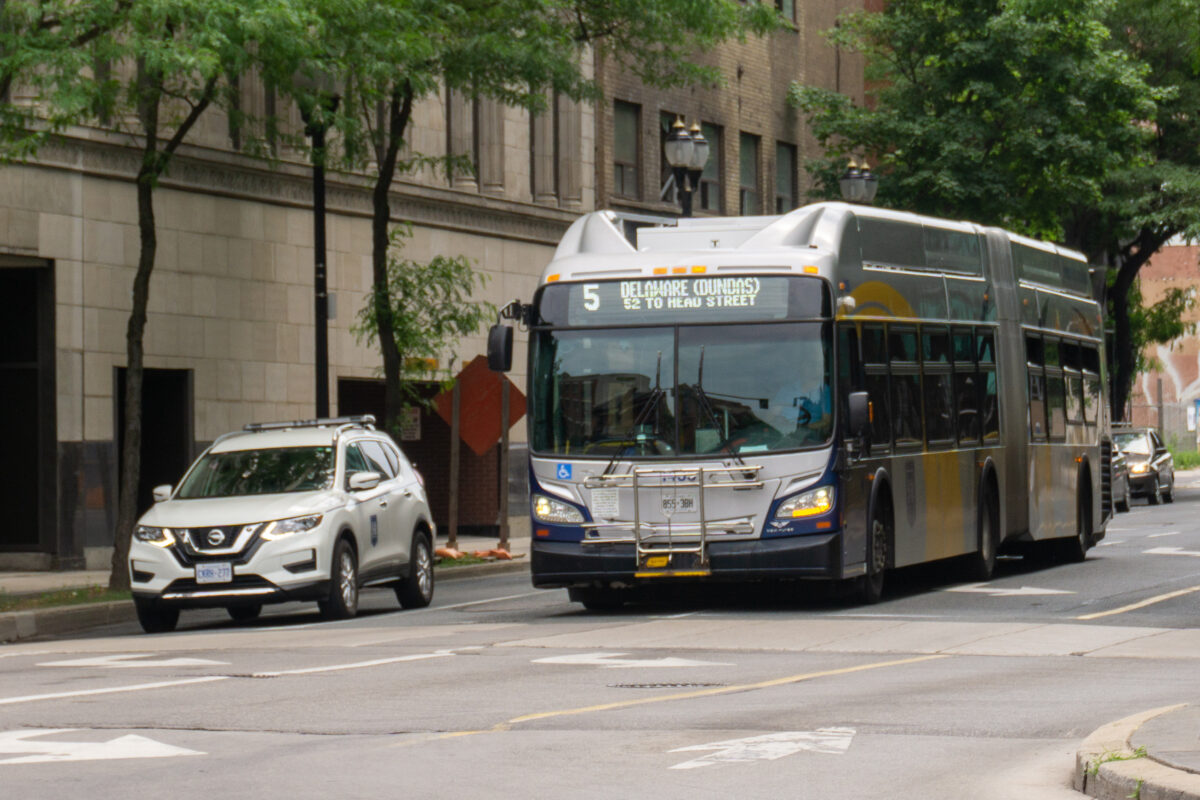Last week, Hamilton City Council were asked to again extend the deadline for ending Hamilton’s long-standing fare waiver for persons who board HSR public transit with a mobility device, including walkers, or a Canadian National Institute for the Blind card.
At Monday’s (June 17) Public Works Committee, Mary Love of the Council of Canadians, Hamilton Chapter, Katie King of Hamilton Community Benefits Network, Tim Nolan of Accessibility Hamilton Alliance, and Brad Evoy of the Disability Justice Network of Ontario were among the delegates asking for free fares to continue.
The CNIB fare waiver has been in place for decades, voluntary pay for wheelchair mobility devices was implemented in the late 1990s when the first purchased low-floor buses with rear door ramps. At the time, the former Region of Hamilton-Wentworth determined it too costly to install rear door fare collection boxes.
Over time, the “Voluntary Fare Program” expanded to include walkers and four-prong walking canes. The City of Hamilton removed four-prong walking canes from the program in the late 2010s.
With the implementation of front-door boarding for mobility devices and PRESTO tap fare cards, the City announced an end to the free fare program, effective January 1, 2024.
In place of the fare waiver, the HSR announced that individuals below the Low Income Measure would now receive a 30 percent fare discount in a new Fare Assist Program. Approximately 80,000 Hamiltonians qualify for this program.
Critics note that represents a significant cost increase for individuals who presently do not pay fare.
The HSR estimates it will collect approximately $900,000 per year in fare from people who presently do not pay.
In mid-December 2023, responding to calls from many of the people delegating this week, Hamilton City Council created a six-month “grace period” extension of the free fare program.
Two-Third Majority Vote of Council Required to Continue Free Fares
When Council approved the six-month grace period in December, it voted to begin fare collection on July 1.
Any change to this decision is a reconsideration vote, requiring a two-thirds majority to change the past decision.
Council meets Wednesday, June 26 for its final ratification meeting before fare collection is scheduled to resume.
Councillor McMeekin: How Will City Fund Free Fares?
Many of the delegates who called for free fare stated that public transit should be free to all users, calling on Hamilton City Council to lead the way in Canada, similar to how Saskatchewan Premier Tommy Douglas created the first universal health care system in Canada back in 1962.
In his conversations with Douglas, McMeekin said something that ” stuck in my mind was that he never proposed a program, including Medicare” without ensuring the government raised the revenue needed to fund it.
“With the Medicare plan, there was a percentage raise in the income tax and some other things.”
“I just want to make it clear to anybody who thinks there’s a magic wand out there to wave, you know, it’s not necessarily helpful or unhelpful, it’s just the reality is you got to pay for it. “
Fares Will Not Be Enforced on July 1
The HSR has previously stated it will focus on “education rather than enforcement” for an undefined period of time after the free fare program ends on July 1.
Concerns about Front Door Loading of Mobility Devices
Two HSR riders, who use wheelchairs, delegated asking councillors to direct the HSR to resume boarding wheelchairs using the rear doors of buses, instead of the post-COVID practices of lowering the front ramp and wheelchairs boarding with other passengers.
“I’m not exaggerating for effect when I say that I often find the HSR a hostile and inaccessible place, and the most recent policy changes have become a clear barrier to using the service,” said James Kemp.
“Now at the front door only policy the driver rarely even checks the mirror to see if it’s even possible to load from the front, they just dropped the front ramp regardless, we then board to find several people in the safe path to the PMD [personal mobility device] positions, we then have to ask everyone to move what we load in and the compartment becomes chaos.”
” When from boarding on buses, I experienced many barriers. One barrier is that most of the time, passengers sitting in the front priority seating either won’t move or are unable to move,” said Jack Maurice. “This presents a barrier because I cannot fit past the other passengers when from boarding. I’ve had my rams or wheels accidentally hit other passengers seated in this area. This is something that can and has been avoided by boarding on the rear entrance on buses.”
Production Details v. 1.0.0 Published: June 23, 2024 Last updated: June 23, 2024 Author: Joey Coleman Update Record v. 1.0.0 original version


This is atrocious. Around the time this subsidy was taken away, all city managers received a 15% raise – for no reason. Managers who already make north of 100K. Talk about tone deaf.
This really shows where Hamilton’s priorities lie, a city with one of the highest poverty rates in the whole country. Yet another stain on our lackluster municipal government.